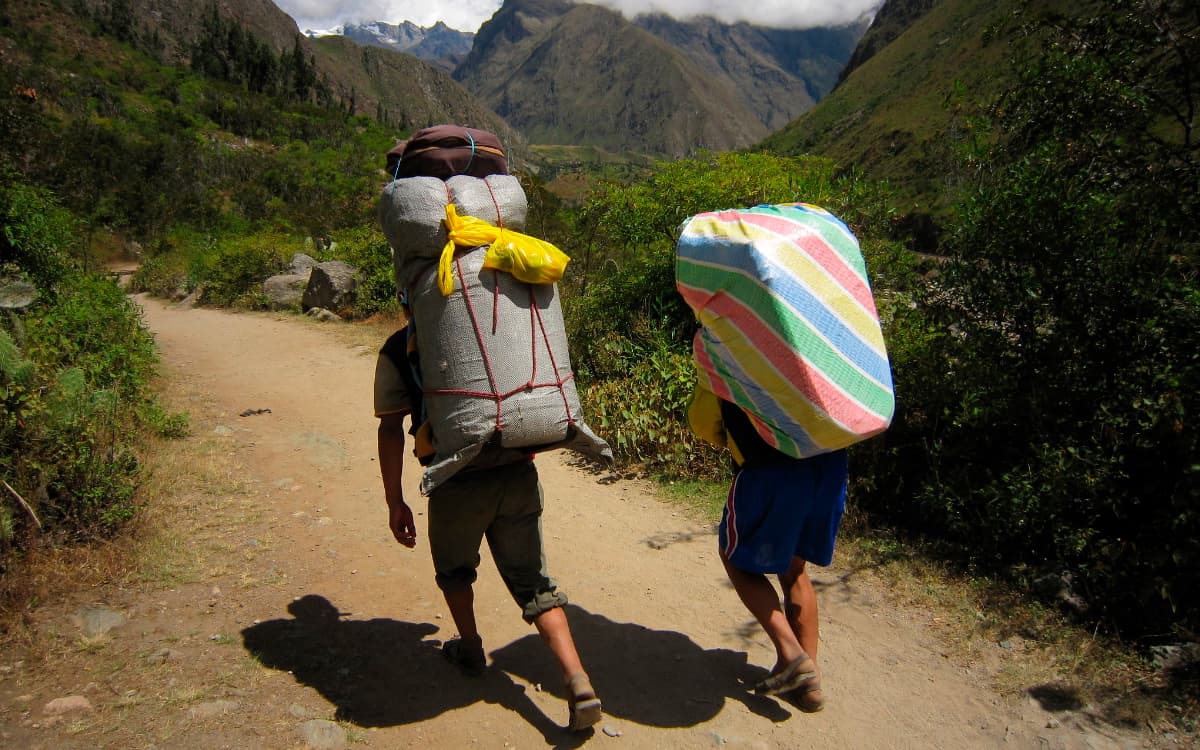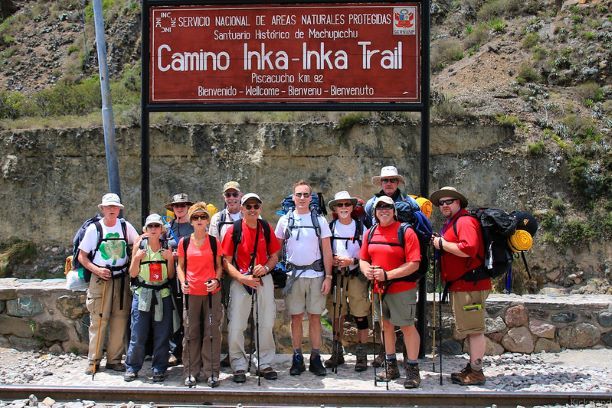Thousands of people make the Inca Trail every year. They usually complete the mountainous route 43 km approx. in 4 days. For many, the experience is a journey of a lifetime and the fulfillment of a personal ambition. The satisfaction of having completed the tour and arriving at the spectacular Inca ruins of Machu Picchu is hard to beat.
However, the feeling is even better knowing that all porters have been well cared for and treated with the respect and dignity they deserve. Now that most Inca trail hikers need to take a hike organized by a local tour operator, the camping equipment (tents, dining tent, kitchen tent, tables, chairs, stove, gas tank and food) is carried in the backs of human chargers. Pack animals such as horses, mules and llamas are prohibited on this route.

inca trail trek 
inca trail trek trilha
The prices that the tour operators for this 4-day trip can vary considerably as well as the rates of remuneration to the carrier and conditions established by each company. However, trying to find out whether or not a company cares for its carriers can be quite difficult.
Tour companies are often not completely honest about the wages they say their porters pay and the real facts are difficult to verify. If you ask a porter how much they are paid next, you will very rarely get a direct answer. If a porter is well paid, he is likely to tell you that he is underpaid, so you can tip him better!
If he is underpaid, the company has likely instructed him to lie and tell you that he receives more than he actually does. If you complain about your salary to tourists on the trip, then it is unlikely that you will continue to work in the company!
What is a “Porter”?
The Porters of the Inca Trail are one of the most important people on the route to the Inca Trail to Machu Picchu and perhaps the least understood by both tourists and the operating agencies of the route to the Machu Picchu sanctuary. The porters are people endowed with great strength since on their backs they carry everything necessary for our trip, a particularity of the porters is that they are the last to leave our camp because they have to dismount and keep the tents, and all the implements for your trip to Machu Picchu.
And they are the first to arrive at the new camp, since when a traveler arrives almost everything is ready, such as the armed tents, the armed kitchen tent, the dining tent etc. At times the porters trot during the tour, surpassing the travelers, this shows how impressive their physical strength is.
Unfortunately some, not all the tourist companies operating the Inca trail do not give them the importance they deserve so they DO NOT provide them with adequate clothing to carry out their work, they overload in weight, they do not provide them with special equipment to carry the things, they give them a very low remuneration and especially very, very poor food and it is as a result of this that you will be able to see porters thirsty, hungry and with low morale on the Inca trail.
The government of Peru has created a law, the law of the porter, which requires the operating agencies to give the appropriate conditions to the porters, but unfortunately many do not comply. One of the best ways to support the Porteadores del Camino del Inka is by leaving them tips, this causes them to raise their salaries and many porters pay for their family’s food and education with the work they do.
History of the work of the porters:
The tourist use of the Inca Trail, intensified in the 80s, at this time, the first porters began to work at a time, in which there was no regulation of use of the Inca Trail and therefore, there was also an abuse of These workers, who were exploited, carrying a lot of weight (40 kg. in extreme cases), were not given adequate footwear or adequate clothing for the temperature changes typical of the area and did not eat the same as the passengers. And as if that were not enough, they were very poorly paid.
In 2002, DIRCETUR – Regional Directorate of Foreign Trade and Tourism, INRENA – National Institute of Natural Resources and other institutions, issued the “Tourist Use Regulations for the Inca Trail network of the Historic Sanctuary of Machu Picchu”. In said regulation, they considered the porters as Support Personnel, they regulated their employment situation and decent working conditions.
Weight limit for Porters of the Inca Trail.
The maximum weight that a porter can carry on the Inca Trail to Machu Picchu has been limited to 25kg, this includes your personal items of 5 kg. Each carrier is weighed at the beginning of the tour and again in Wayllabamba at the beginning of the second day.
This regulation was introduced in 2002 and has been strictly enforced. Businesses that violate this law receive fines and risk losing their licenses. However, as with most regulations, many companies go to great lengths to not comply with them.
Meals and sleeping conditions.
The biggest difference between a responsible society and an irresponsible one is how to take care of their carriers on the journey. Many porters are given very little to eat on the way. They have to wait to see how much the tourists have eaten according to how the leftovers are divided among them. Remaining many porters at the end of the road tired and hungry. Generally, the porters sleep together in the group dining room and kitchen tents.
Porter’s Culture.
The Quechua race has a history of being oppressed, first by the Incas, then by the Spanish, and then by landowners. Only in relatively recent reforms have the Quechua people began to own their own land. Due to their long history of being dominated by many others, they have low self-esteem. It is important on the Inca Trail to try to get involved with the porters in your group. Grab some coca leaves to share with them and try to learn a couple of basic Quechua words (the guide will be happy to help you). Many of the porters have incredible stories to tell about the traditions and life in their villages. At the end of the walk, don’t forget to show them that you appreciate their work and value their contribution to the walk by verbally thanking them and giving them a tip.
Tipping for the Porters of the Inca Trail
Tipping for the porters of the Inca Trail and cook should depend on the quality of the service you received and your will. However, even if you think the food was terrible and the guide did not speak or explain well (which we hope is not the case), the porters were probably the ones who worked hard carrying the camping equipment and tents, so do not tell forget to leave a tip. The amount is up to you, but as approx. It is recommended that each porter in your group bring home an extra 45 to 55 soles. Try to take a lot of small changes so you can tip directly to the porters. This is far better than giving the money to the cook or guide who is later divided among the porters so often the money is misallocated.
Role of the porters
During the 4-day Inca Trail trek and this trek alone, the group is made up of walkers and our staff, included in the price, which is made up of one or more guides, one or more cooks and porters. The Inca Trail trek is limited to 500 people per day including staff. Being made up of 40% hikers and 60% staff, we prefer to indicate that the hike is limited to 200 people per day. Our staff represents more than half of the total authorized persons.
There are 2 types of porters: those included in the price, called group porters, and personal porters, which are optional and that you can hire at a price of S / 452 for the entire duration of the trek.
It should be noted that all porters are authorized by the Government to operate and must have a license to access the Inca Trail.
Group carriers
Group porters, included in the price, are responsible for carrying the equipment for the whole group, such as food, water, tents, tables and chairs for meals, kitchen equipment, first aid equipment including an oxygen tank, a shortwave emergency radio. As they are included within the limit of 500 people per day and the number is proportional to the number of hikers, our Agency reserves these porters when booking your trek. For example, if you are 3 hikers who book the trek, our agency will pay your final reservation to the Government for 3 people and about 4 porters. This reservation is final and nominative.
When to decide to take a personal porter?
As mentioned above, the porters are part of the maximum limit of 500 people per day for the trek. Since places sell out quickly, we recommend that you choose the porters when making your reservation online. If you decide to add a personal porter after your reservation, there must be spaces available. However, if you are lucky, you can sometimes “get back” the group carrier from another trekker who has canceled their trip, as our Agency would release the carrier assigned to that person.
Finally, please note that as the porters are booked, assigned and paid immediately after your reservation, it is not possible to cancel them afterwards.
How does the law regulate the work of the carrier?
Among other aspects, the regulation considers the following points.
- The weight is regulated, which the porters must carry to 14 kg., Which is controlled during the journey.
- It is determined that the porters unionize and treat their salaries at this level, which must be in accordance with the law.
- They must be provided with adequate equipment to transport things, such as: jackets, backpacks, head protection, suitable shoes among other implements. As for shoes, the porters hardly wear rubber sandals, called “flip flops”, many of them have worn flip flops since they were children and in many cases it makes them uncomfortable to wear shoes.
- The carrier must be registered in the Porters of the Inca Trail Registry, for this purpose he must present a Criminal Record Certificate and a Health Card.
- The porters must be trained for their own safety, as well as for the Travel Agencies.
- Inca Trail Machu Picchu, as a Travel Agency complies with all the requirements established by the Regulation.
How to collaborate so that the carrier has a decent job?
To collaborate with the porters and watch over their work. We must take into account the following recommendations:
- Avoid doing the Inca Trail, for a very cheap price.
- Agencies that charge very low prices pay low prices to their employees
- Be attentive, if the weight carried by the carrier is controlled by park rangers
- Do not exceed 5 kg in your luggage bag
- Ask the agency and make sure that it is complying with its carriers as the regulation says
- You can request a personal porter, so you would be giving extra work.
- Be a friend of the carrier, so you will have the option to learn about their culture and customs.
- If you are going to give them a tip, it is better to give it directly without intermediaries.
- At the end of the trip, in your report, please let us know what the carrier received and of course how his work was.
If you travel to Cusco, we recommend you to visit another impressive destinations like the rainbow mountain tour, the humantay lake tour, or the sacred valley tour, which only takes one day. But if you are gonna to stay more days in Perú, other archaeological places you can know will be the machu picchu day tours from cusco.










